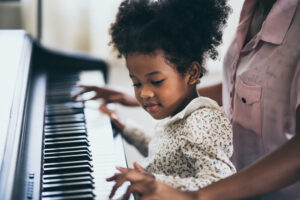The benefits of learning music

In this article, we go through the developmental advantages music can bring to your child, as well as ways to incorporate rhythm, melody and song into your home life!
It’s clear why many little ones are drawn to music – they can bop their heads, sing aloud as much as they like or move their bodies to the rhythms without fear of being told off. These actions can be a natural outlet for most young kids, but did you know that music has other proven benefits for your child’s early development? These can include boosting their fine motor skills, their grasp of language, their ability to express themselves and their self-esteem. Let’s dive in!
The importance of music
There are many positive effects that music can give your young child. These advantages are multi-layered, encompassing their social, physical, academic and emotional development.
Social connections
Music is a very bonding thing. Studies suggest that singing together has a powerful effect on the brain, reducing feelings of loneliness and amplifying a sense of connection. Therefore learning or engaging with music can be a great setting for your child to bond with others. As a young learner, activities like singing, dancing and rhyming feel close to playing, and are fun and easy to get involved in, whilst automatically building up communication skills and a sense of togetherness. This is especially relevant for shy children, but all kids can benefit from the social boost that music provides.
Boosting the brain
There are a number of studies that strongly suggest a relationship between exposure to music in early childhood and an acceleration in brain development. The research indicates that kids who regularly engage with music from an early age tend to have stronger reading and language learning skills, as well as better communication. What’s more is that separate studies also suggest that learning an instrument early on can boost your child’s mathematical abilities. The influence music can have over brain development is one of the greatest gifts you can offer your young learner!
Managing feelings
Music has an inexplicable influence on our emotions, more than most art forms, and can also be a mirror for expressing how we feel. Everyone has experienced this, from a song that reflects back the pain we are experiencing, to the upbeat track that puts a smile on our face and a pep in our step.
Plenty of parents utilise this at bedtime, by playing calming, classical music to help ready little ones to sleep. However, music can, and probably should, be used in the opposite situation too – as a mood-booster! Fostering the use of music to express or manage emotions can be a really beautiful gift to your child. Not only will kids learn a new avenue for self-expression, but they will also learn to reach for and take comfort in music during more challenging moments.
Working as a group
Music can be a solo pursuit, especially for older kids. For younger learners however, music is often a group activity. This could come in the form of dancing to songs together as a family, singing nursery rhymes at home, or a music class of some kind that involves other children. Music is a naturally bonding medium, a kind of art that usually involves teamwork, communication and cooperation. Whether it’s through repeating rhymes or lyrics, singing and beating a rhythm as a group, practising rounds or harmonies, or learning a ‘call and response’ song, music can often involve working together to achieve a common goal. This is a great way to lay the foundational skills necessary for group work and teamwork, an ability that will stand to your child as they progress through their education and indeed, their life.
Gross motor skills
Believe it or not, music can help kids of all ages to improve their gross and fine motor skills. Most kids are the same – when they catch a snippet of a song, they can’t help but dance and sing along! Although this seems like a simple activity, it can actually help little ones cement the building blocks of their mobility skills such as bending, jumping, kicking, waving arms etc. Dancing rhythmically is also a wonderful way to increase your child’s muscularity and strength, positively influencing their gross motor skills.
Fine motor skills
Fine motor skills are how we make smaller, more specific movements, particularly with our hands and wrists. These skills involve dialogue between the brain, nerves and muscles to produce exact movements. Fine motor skills are important in carrying out lots of school-related tasks and they’re built on the foundation of gross motor skills that allow us to make bigger movements. Examples include gripping a pen or pencil, drawing pictures and writing, using scissors, glue or rulers. Playing an instrument requires children to hone these connections between their hands and their brain, building up their fine coordination and allowing them to transfer these skills to other tasks.
Storytelling
Songs have lyrics that are often interesting and different to everyday speech, helping to create images and ideas that spark a child’s imagination. Rhythm, phrasing patterns and musical cadence all add an extra layer that can help kids memorise the words and grasp the ideas behind the words better than reading or speaking alone. This means that songs can be a great way to teach children about the world around them, from plants, animals and people, to events and ideas. Unsurprisingly, nursery rhymes have been linked to better storytelling skills, a vital element of communication, socialising and creativity. By showing your little one how to participate in a nursery rhyme, you can pave the way for your child to become a good storyteller and all of the helpful doors that this will open for them.
Confidence
Music is a lovely avenue for building self-esteem in children. Singing, dancing, clapping, nodding and drumming a beat all require little ones to use their voices and their bodies to occupy lots of auditory and physical space. This can be a clever way to naturally help less confident kids to blossom.
For children who have Autism Spectrum Disorder, music therapy is a wonderful tool for developing self-esteem, as well as their overall skill set. For these little ones, traditional teaching methods might not prevail in the way that they might need. Music might pick up this slack, providing an alternative avenue of communication and learning for children at a variety of levels. Singing songs and picking out a melody on an instrument can give children of all needs a real and lasting boost in self-confidence.
Musical activities at home
For those parents who perhaps didn’t grow up with music and feel like beginners, here are some easy activities you can try at home.
‘Band’ practice
Gather any workable home materials and ‘play’ music together – whether this means melodies or beats. You can use a toilet paper roll as a drumstick or fill a paper bag with rice for a homemade shaker. If you’re brave (and the neighbours allow it!) you could use pots, pans and wooden spoons!
Dance it out
This one is very simple, but no less fun – put on a collection of your child’s favourite songs and have a dance party! Encourage your child to get their groove on, and maybe even make up your own dance routines together. This is also a great way to get rid of any stresses, whilst also boosting their coordination and creativity!
Musical chores
Imbue some of the least fun activities (chores) with a fun and exciting soundtrack that every member of the family can sing and dance to together as you go about your jobs. Good options for little hands include wiping the lower half of the windows, tidying away toys or ‘helping’ you polish. This is an easy way to incorporate a little more music into your family life, while also keeping the house clean along the way!
Older kids
Not only does music bring a lot of joy, there are other ways it continues to benefit your child as they get older.
Spatial intelligence
Spatial intelligence is the ability to visualise with the mind’s eye, glean information visually and do well at tasks related to shapes, patterns and colours. It’s an excellent kind of intelligence for problem-solving, from complicated maths, to drawing graphs or packing a lunch box with everything needed for the day.
Creativity
Music is a creative pursuit and like most arts, questions about it often have more than one right answer. This is quite different to the traditional skill set honed at school and it’s the creative thinking needed for music that allows a person to come up with unusual solutions to problems, examine issues from less rigid perspectives and generally think outside the box.
Embrace cultures
People who differ in language, religion or ethnicity can appreciate and enjoy each other’s music. It’s one of few things that has no borders and is its own form of communication, thus music encourages kids to engage with aspects of other cultures with respect and empathy for the people who created it.
Group work
As music lessons become more serious, older children may get the chance to play in an ensemble. This could be a jazz group, orchestra, choir, chamber group or band. For these to work, the kids must work together in harmony and take responsibility for their part. This takes commitment to learning the notes, practising properly and making time for rehearsals, all with a shared goal in mind, be it a performance, a set or a competition.
Hard work
At the end of the day, continuing with an instrument as you get older takes time and effort. Music is an arena where practice and dedication makes all the difference to whether the right notes are played, the rhythms are correct, the tone of the instrument is as melodic as possible etc. Putting in this effort involves a stretch of students’ inner resources and at times, their resilience. By studying music, kids learn the value of consistent effort in achieving excellence and are also rewarded with the concrete fruits of their labour – a beautiful piece of music! This is a very useful skill in other areas of an older child’s life, from exams, to exercise and beyond.
In addition to the happiness and reward of being able to sing a song or play an instrument, you will now hopefully be able to see how learning music benefits children in a number of interesting ways, from their very early stages, all the way through to their older years. It’s also worth mentioning that, while these advantages are wonderful, music and arts education is also a worthy end in and of itself. Whether you choose to bring music into your home or opt for a more formal education for your little one, you are sure to experience the many benefits it will bring to your child’s life.
Image Credit: Shutterstock











Comments